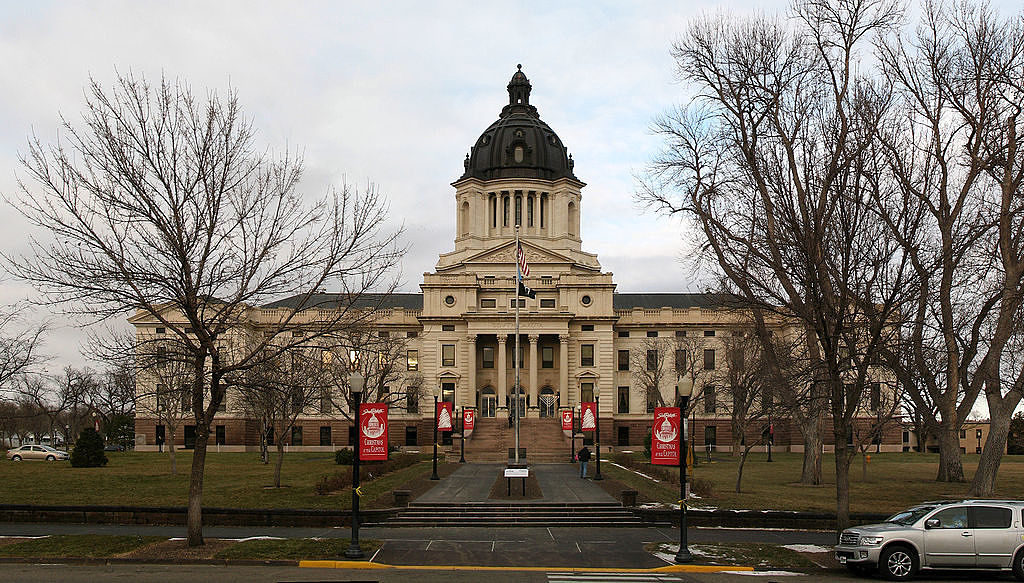
PIERRE, S.D. — At the request of Governor Dennis Daugaard, Chief Justice Gilbertson and legislative leadership, The Pew Charitable Trusts and the Crime and Justice Institute at CRJ provided technical assistance to the South Dakota Juvenile Justice Reinvestment Initiative Work Group.
The work resulted in the successful passage of comprehensive juvenile justice  reform legislation to improve outcomes and save millions in taxpayer dollars.
reform legislation to improve outcomes and save millions in taxpayer dollars.
The Juvenile Justice Public Safety Improvement Act (JJPSIA/SB 73) passed unanimously in the Senate and by a 60-7 vote in the House and was signed into law by Governor Daugaard on March 12, 2015.
In partnership with the Public Safety Performance Project of The Pew Charitable Trusts, CJI’s Barbara Pierce Parker led a team, including CJI’s Tessa Upin, in providing technical assistance to the 17-member bipartisan inter-branch Juvenile Justice Reinvestment Initiative (JJRI) Work Group. The state previously partnered with CJI and Pew in 2012-2013 to assist with the development and passage of the Public Safety Improvement Act (PSIA/SB 70) that transformed South Dakota’s adult criminal justice system. Encouraged by early successes from the adult reforms, the JJRI Work Group engaged in an intensive process with the assistance of CJI to gain a clearer picture of their juvenile justice system and learned the following:
 Fewer youth are being admitted to probation and the Department of Corrections (DOC), but the length of time youth spend out of home, committed and on probation has increased over the past 10 years.
Fewer youth are being admitted to probation and the Department of Corrections (DOC), but the length of time youth spend out of home, committed and on probation has increased over the past 10 years.- Nearly 75% of commitments to DOC are for misdemeanors, Children In Need Of Supervision (CHINS) violations, and probation violations.
- Evidence-based interventions for juvenile offenders are not sufficiently available in the community.
- Pre-court diversion is used inconsistently across the state.
These findings, along with a set of recommendations, were included in the Work Group’s final report in November 2014. As an outgrowth of these recommendations, JJPSIA was drafted, filed, passed and signed into law. The legislation will result in:
- Preventing deeper involvement in the juvenile justice system through expansion of the use of diversion by providing fiscal incentives to counties; the creation of a juvenile citation process to address certain low-level violations swiftly and certainly; establishing guidelines for the duration of probation to encourage discharge of juveniles doing well and to free up court services officer time to focus those at higher risk to reoffend; and, developing a graduated response matrix to hold juvenile probationers more accountable through swift, certain and proportional responses to violative behavior
- Improve outcomes by expanding access to evidence-based interventions in the community; monitoring implementation and delivery of treatment in rural areas; and evaluating strategies to improve outcomes for justice system involved Native American youth.
- Focus residential placements on youth who are a public safety risk by creating a presumption of probation for all, but establishing criteria allowing youth posing a risk of harm to others to be committed; establishing Community Response Teams (CRTs) as resources to help judges identify community-based alternatives to DOC commitment; instituting performance-based contracting for providers to meet treatment goals within established timeframes, when possible; requiring state-run juvenile corrections facilities to design and operate programs to provide the opportunity for release to aftercare within three months; and, requiring findings from the court prior to placing a child in county detention for more than 14 days in a 30-day period.
The expected impact of this policy package is a 29% reduction in the number of juveniles placed on probation in the next 5 years and more than 50% fewer youth placed in state-funded facilities by 2020 and over $32 million in averted costs. To jump start these efforts, the Governor included a $3.2 million upfront investment in the state budget to support the changes in SB73 including incentivizing the use of diversion and expanding community-based services. With expected savings over time, the state has reinvestment opportunities in the future to provide continued support in transforming South Dakota’s juvenile justice system.